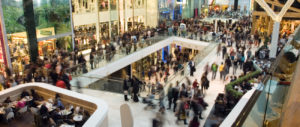 Shopping these days is certainly becoming a novel experience for baby boomers. We grew up with a whole host of brick and mortar stores, from Sears and J.C. Penney, to E.J. Korvette and Kaufmann’s. Shopping meant putting on decent clothes and getting in the car to go downtown. Ladies supposedly wore white gloves to have lunch in the tea room at Hutzler’s in Baltimore. Urban renewals across the country killed off a lot of downtown shopping but the stores just moved to the shopping centers and malls on the edge of town. New locale, same stores and brands.
Shopping these days is certainly becoming a novel experience for baby boomers. We grew up with a whole host of brick and mortar stores, from Sears and J.C. Penney, to E.J. Korvette and Kaufmann’s. Shopping meant putting on decent clothes and getting in the car to go downtown. Ladies supposedly wore white gloves to have lunch in the tea room at Hutzler’s in Baltimore. Urban renewals across the country killed off a lot of downtown shopping but the stores just moved to the shopping centers and malls on the edge of town. New locale, same stores and brands.
Small independent stores used to make up the bulk of the retail landscape. Around sixty per cent in the 1960s with chains accounting for twenty-nine per cent. Now, independents barely account for seven per cent. Mergers of chain stores happened so fast that the change barely registered. But look around now. Sears is in bankruptcy, Macy’s is failing, and many other department stores are struggling to hang on in the face of online shopping.
Now we don’t have to get out of our pajamas to buy whatever we want from Amazon Prime and have it the next day, or soon in an hour via drone. Groceries can be ordered online and delivered to your door. We do our own product research via customer reviews and probably know more than the sales person on the store floor. Sixty-seven per cent of millennials prefer to shop online. Forty-one per cent of baby boomers do as well, while only 28 per cent of seniors prefer that method. Those seniors may not be able to fight the trend much longer.
One type of shopping that has prevailed is catalog sales. Around holiday time our mailboxes are filled with pages plastered with delights. Food, clothes, gear and toys are still be hawked the old fashioned way in a catalog. The ordering, payment and delivery options have all been updated with quick and easy online systems, but the wishful thinking still begins with a paper presentation. It’s amazing that consumers still enjoy shopping that way.
What’s next? Drone delivery has already been mentioned but trips to a live entertainment driven retail venue could also make a comeback. Going to the mall is still a form of entertainment, so perhaps creative retailers can draw us back to a physical marketplace. Some place where you can feel the cashmere, sit on the bicycle, taste the brie or try out the fishing rod. Just maybe.
Jay Harrison is a graphic designer and writer whose work can be seen at DesignConcept. His mystery novel, Head Above Water, is available on Amazon and Kindle. You can also visit his author page here.